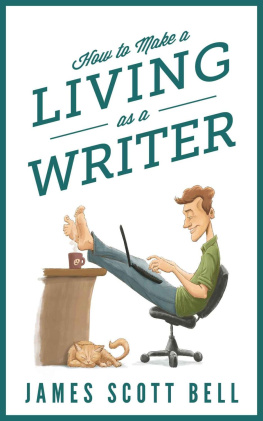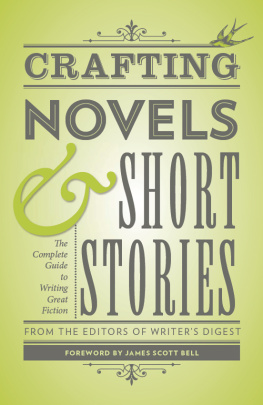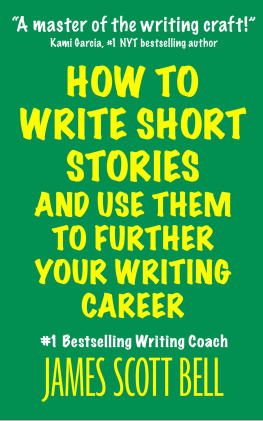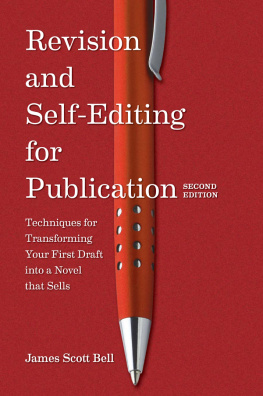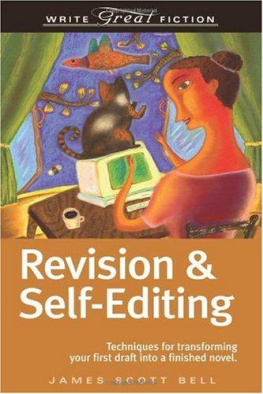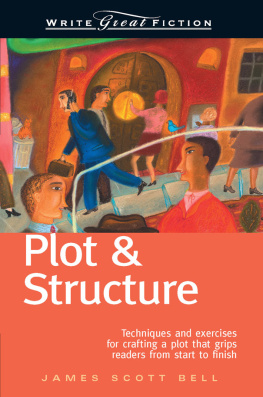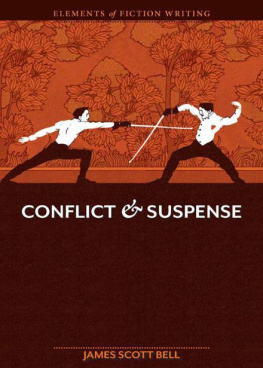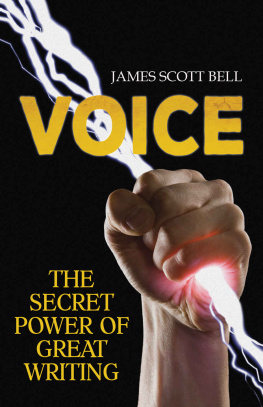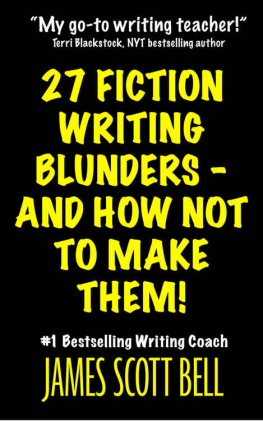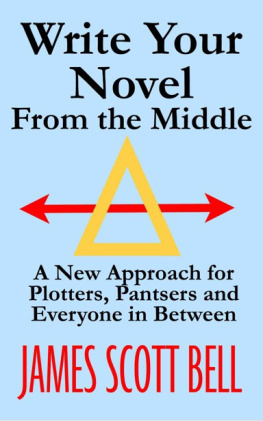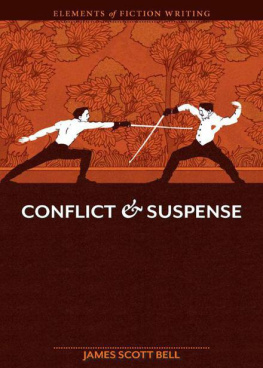Writing Fiction for All Youre Worth
James Scott Bell
Copyright 2011 James Scott Bell
All Rights Reserved
No part of this publication can be reproduced or transmitted in any form or by any means, electronic or mechanical, without permission in writing from the author.
Table of Contents
INTRODUCTION
In Defense of How-to-Write Books
Every now and again I hear some author putting down how-tos. You can only learn to write by writing, theyll say. Dont waste your time studying writing books. Just put a page in front of you and write!
Which strikes me as making as much sense as saying, You can only learn to do brain surgery by doing brain surgery. Dont waste your time studying brain surgery. Just cut open heads and go!
Excuse me if I show a preference for a sawbones who has studied under the tutelage of experienced surgeons.
Another trope is, No one ever learned to write by reading about writing. Really? Isnt that a bit cheeky, unless youve interviewed every published writer out there?
The writer I know best me absolutely learned to write by reading how-tos. I had been fed the bunk that writers are born, not made while in college, and I bought it, in part because I took a course from Raymond Carver and couldnt do what he did. (I didnt know at the time that there was more than one way to do fiction. I thought everybody had to pass through the same tunnel.)
When I finally decided I had to try to learn to write, even if I never got published, I went after it with a club. I started gathering books on writing, read Writers Digest religiously (especially Lawrence Blocks fiction column), took some classes, and wrote every day. Living in L.A. it was required that I try screenwriting first, so I wrote four complete screenplays in one year, giving them to a film school friend, who patiently read them and told me they werent working. But he didnt know why.
Then one day I read a chapter in a book by the great writing teacher Jack Bickham. And I had an epiphany. Literally. Light bulbs and fireworks went off inside my head, and I finally got it. Or at least a big part of it.
So I wrote another screenplay, and that was the one that my friend liked. The next one I wrote got optioned, and the one after that got me into one of the top agencies in Hollywood.
After a couple of frustrating years I tried my hand at writing a novel. It sold. Then I got a five book contract, and I was on my way as a working novelist.
In great part because I finally got it from a how-to book.
Thats not to say I might not have gotten it some other way (like trial and error over ten years), but at the very least my study program saved me time. And thats the reason I write the occasional how-to book to save writers time, and give them the nuts and bolts they need to make it in this racket. I want to write the sort of books I was looking for when I was wandering in the darkness.
Apparently its helped. Plot & Structure (Writers Digest Books), which came out in 2004, was the decades #1 bestselling book on the craft of fiction writing. As of this writing, it is still #1. Appearing regularly on amazon.coms top ten list in the same category are my Revision & Self-Editing and The Art of War for Writers.
I keep hearing from people who have sold books based on what they learned from me.
So I repeat: the bromide that you cant learn to write fiction from writing books is the bunk.
How did the writers of the past learn? Many of them had a great editor, like Max Perkins. Some had an older writer who read their stuff and suggested ways to make it better. Some, like the great writer-director Preston Sturges, learned from the how-to books available in his day. (In Sturgess case, it was the books of Brander Matthews.)
So a good how-to book is like an editor or teacher. Is there not some value in that?
Now it is quite true you cant just read how-tos and get better without practice. You have to write every day, and apply what youre learning. But if you write blindly, without correction and education, youre most likely going to be turning wheels like that rodent in the cage. A lot of effort but getting nowhere.
I am a firm believer in how-to books, and write them because I want to give back something to the craft I love.
And thats why Ive made this book available. It is a collection of some of my past articles posted on the internet, primarily in the group blog Kill Zone. To this content Ive added practical application exercises, additional articles and notes.
As a writer, my philosophy is this: if I can find even one thing in a how-to that helps me, that elevates my writing and makes it stronger, its worth it.
In that spirit I offer this to you. I think you will find more than one thing of value here, and I think it will be worth it to you.
Keep writing.
James Scott Bell
A NEVER ENDING WRITING IMPROVEMENT PROGRAM
In Japan, after World War II, the concept of kaizen was introduced into their industrial culture. It resulted in a huge boom in technology and manufacturing that rebuilt Japan and made her prosperous.
Its a simple idea. It means ongoing quality, and systems set up to test quality all the time. And, every day, striving to do something better.
Why should a writer do any less?
You are responsible for designing your own writing improvement program. One that never ends.
To do that, you have to look at both yourself and your fiction. And you have to take the critical success factors of each and figure out ways to make them better.
But most writers dont think in a kaizen type of manner. We are artists, after all! We want to frolic in the tulip fields of the imagination! We dont want to get weighed down with things like, yikes, strategic planning! We could have gone to engineering school if we wanted to do that kind of thing.
Come on there, Bunkie. Its not that difficult.
Heres the idea. Even if you improve an area only 10%, if you do that with each factor you are improving yourself in an exponential fashion. Thats how to get intentional about your career.
The Six Critical Success Factors of Writers
Here are the six areas you need to excel in if youre going to make it as a writer:
- Craft knowledge
- Discipline
- Perseverance
- Risk
- Market sense
- Professionalism
Lets break these down.
Craft knowledge
Mastery of the craft, the tools and techniques of fiction, is of course essential to your success. If you dont know how to put together a scene, or show instead of tell, or construct crisp dialogue, or any of the other nuts and bolts, its over. You wont write salable fiction.
Keep learning your craft. Do it systematically. At the start of my career, I created a Writing Improvement Notebook (see The Art of War for Writers for details of whats in this notebook). Do the same. Make it your own, use it. Spend time in it every week.
Discipline
This means, simply but powerfully, a quota of words. Every week. I split my writing week into six days, and go for 1,000 words a day. But I track it weekly, so if I miss a day I know I can make it up later. I take Sundays off from writing, to recharge my batteries. (Discipline is also about working smarter, not just harder).


